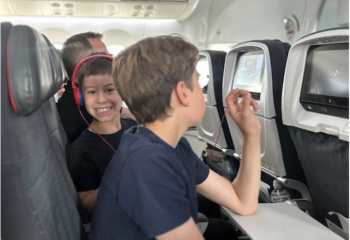
By Pamela Chan, Contributor
When my 6 year old came down with a brief case of the stomach flu, I didn’t expect to end up in the Emergency Room. And I didn’t expect to reveal a deeply held feeling about my life.
In early 2016, my son came down with a brief case of the stomach flu, and his twin got sick a few days later and took five days to recover. On the following weekend, I realized that I was coming down with the same condition. I became severely dehydrated and could feel myself crashing physically and mentally. When my husband called the Nurses’ Line, I was advised to go to the ER. In those few moments before we headed out the door, I was feeling very weak, dizzy and disoriented. I was talking about all kinds of random topics – probably in an effort to distract myself.
“I feel so isolated!”, I blurted out – as the penny dropped. I wasn’t feeling well and this was the issue that was even bigger than the symptoms I was experiencing.
I went to the ER, got an IV drip and came home a few hours later. But as the days, weeks and months have passed since then, I’ve wondered about that statement.
“Am I isolated?” Not physically but socially – yes I’m isolated socially.
“Are other women I know feeling isolated?” Yes, I suspect there are many who feel that way.
“Have other women in my family gone through the same experience? The answer is yes, and in some rather dramatic ways during the last 100 years.
“Aren’t some women in the world isolated in quite dramatic ways?” Sadly the answer is yes.
If you’re feeling isolated, what can you do to change your situation? Here are some thoughts based on my own journey as a mum of twins, who had children later than most of my friends.
Long distance friendships should be nourished. We no longer have to wait days for a letter or spend a lot of money on long distance phone calls. We can use e-mail, Instagram, Facebook and other social media tools in a thoughtful way to keep those friendships and support networks alive. You will receive back what you give out. Create and curate thoughtful content and you will find that your friends will engage with you and do the same. Focus on the people who interact with you and offer friendship and support. When one of my twins was experiencing projectile vomiting as a newborn, friends around the world shared their ideas and support.
Join a local parent and child group. This might seem like obvious advice, but not every new parent does this and some wait quite awhile before seeking out a group. I lived in Yaletown with my baby twins and went to a group run by the local community nurses at the Yaletown Roundhouse. I knew about the meeting because the nurse who visited me at my home invited me to attend. As you speak with other parents, you will make friends, arrange future play dates and find out about other socializing opportunities.
When you are ready to receive guests, keep inviting friends and family over to visit. If there is a special time or special format that works for you, encourage your visitors to blend in with that plan. As your babies get older, you will find that suggestions to come and visit will become less frequent. You have to keep putting out the invitation but expect that less people will be keen to make the trek to your house or even to meet up. (And when you are ready, do try to meet people elsewhere as well.) Awhile back I reached out to someone who had been keen to visit my newborn twins. It had been a longwhile since we got together so I thought it would be nice to meet up. I was startled to hear back that she focussed exclusively on work and getting together with family and friends these days. So… basically… my invitation to get together was declined. This was someone I used to see on an almost daily basis and now I didn’t. I was out of sight and therefore off the socializing calendar in her busy life.
This is life and this will happen to you. Know that it’s not you and this is not an uncommon situation
Read your local papers, talk with other parents, watch local bulletin boards and check out your community centre and library websites. There are plenty of free events, some of which are ongoing, that provide opportunities to meet other parents. There are story telling sessions, free play groups, opportunities to learn songs and rhymes, local nature walks, meet-up groups and online parent groups setting activities, for example. These events don’t just benefit your children. It’s a way for you to get out of the house, meet other people and forge new friendships.
Think about the flow of your extra curricular activities. Some opportunities for children have a community focus. When you bring your child to the session, there is an opportunity to observe, take part and meet other parents. But some activities can be a bit of a zoo. There are children and parents rushing around, the facilities are crowded and you can barely say “excuse me” as you’re getting bumped about, never mind “Hi, my name is”. One of my twins attended a class for two years. The programme is well respected and in the first year I enjoyed having the opportunity to meet with other parents while I waited for the class to end. In year 2, I was disappointed when I realized that the set-up was different. The parents from the previous year didn’t wait around and I was waiting with an ever changing mixed group of parents who mostly huddled together in conversations or stared at their phones. From my perspective, I missed the opportunity to exchange ideas, meet other women and make new social contacts. I felt like a chauffeur who was dropping my child off and waiting in a busy setting. An opportunity came up to try a related but different activity elsewhere and I can’t say I felt too wistful as my child made the switch.
If you can, take part in a parent participation programme. When we moved outside of downtown Vancouver when my children were 2, we had the opportunity to walk to not one but two Strong Start programmes. These are free to the community, walk-in Early Childhood Education programmes. The parent is expected to stay with the child and take part in the programme. For the first two years I hadn’t attended any such programmes because I would have had to take a complicated transit route. Not all parents have the opportunity to take part in parent participation programmes after they are finished with maternity leave. But if you can – it is an excellent way to meet other parents. In our neighbourhood there isn’t a network of families nearby with whom I can connect socially. These local programmes do pull in people who live in the area. So it is a good way to meet families who live nearby.
Making connections when your child starts school can be a challenge but persevere. Once my twins started preschool, I met other parents while waiting for my children after dismissal or while they played in the playground afterwards. I made friendships that have continued three years later. This started the pattern of meeting parents while waiting, taking part in opportunities to meet up socially and set up play dates. Volunteering in a school is another way that you can get to meet other parents. Because I didn’t start my family at the typical “average age”, it means that I’m not the same age as the average parent. If you feel that you are different in some way – not just because of age – believe me, there are many parents who feel the same way.
Of course you don’t have to just meet “other parents”. You can join a local gym or running club; volunteer for a local organization; join a book club; get involved with your own spiritual (religious) organization; become active in your local federal riding political association; and, do all the kinds of activities that you probably did when you were single or married with children. I have seen some of these opportunities come with childcare options which are either free or low cost. Whenever you hear about that type of set-up, make a mental note.
Follow media productions that have a community feeling to them. When I was on 4 months of bed rest while I was pregnant, I enjoyed watching the Steven and Chris show on CBC. Their warm personalities and interest in their audience and cross-Canada viewers was a joy to experience. I was never in the audience – and will probably not see the taping of Steven Sabados’ new venture called The Goods – but I did feel like I was part of a community.
In recent years there has been an explosion of online groups on social media in which you can take part in conversations. Some mother-focussed websites create Twitter parties and other types of interactive experiences. You don’t have to be a blogger to use a Twitter account. These tools are another fun way to “meet” other people online and exchange ideas.
Get creative. Whether you like to write, draw, paint, cook, bake, sew, do crafts, take photographs, create a garden or build things, to name just a few creative opportunities, there’s nothing more satisfying than creating something that didn’t exist previously. Many women have started an online blog or website as a way to create something new and meet other people. If you’ve always wanted to have a skill, but don’t have it yet, it might be time to take a course. These activities can be solitary in nature but there’s always the opportunity to take part in a group show or attend a class or workshop.
Volunteering provides an opportunity to help out but also to meet people from a broad range of backgrounds. Over the years I’ve had the chance to volunteer for the Vancouver Art Gallery; a little theatre group; a community television show; a zoological society; a local hospital; the Girl Guides; a federal political party riding association; local schools; and, even Meals on Wheels (when I was a child). I’ve met many different types of people and have made lifelong friendships.
Would a once a week class make a difference? This past year (and for a few months in the previous year), I started to take a language class for 2 hours a week. In addition to the benefits of learning a new language (which doesn’t come easy for me), I’m enjoying the opportunity to meet up with half a dozen other women and hear about their lives and experiences.
If you are working outside of the home full time or part time, you have the added advantage of being part of a network of people who exchange chit chat, or more personal types of conversations, and sometimes socialize together. But if you work from home or if you don’t work outside of the home, this critical part of interpersonal connecting with others is missing. If a more connected work environment has been part of your life in the past, you will notice its absence. And if you are feeling isolated, you need to monitor your feelings about how things are going for you and look for ways to make changes.
If you are a single parent, if your spouse or partner travels a lot or if you’re working long hours, it could be difficult to make these changes. What are some small changes that you can make and how can you move steadily towards making more significant ones that could make a difference?
Sometimes a feeling of emptiness in one area of your life can point to other areas that you need to develop. Your situation could well change once you secure a job or start a business; move to a different neighbourhood; change your personal circumstances; or, find yourself with a different schedule as your children get older. It can be helpful to talk with people who know you well and who might have some ideas about ways that you can make changes that will help you to feel less isolated.
If you find yourself exclaiming that you feel “so isolated” – like I did not so long ago – you need to put your concerns front and centre in your life. I find that many of the people around me are preoccupied with their own professional and personal challenges, so in many ways (ironically), my efforts to forge a new path feels like a somewhat solitary venture. If this is your situation, start to share your ideas with close family members and friends who have proven over the years to have your best interests at heart. Focus on people who respect and appreciate the professional and life experiences that you have developed over the years and who believe, unfailingly, in your potential to accomplish more in your personal and professional ventures. Ignore people who diminish your past accomplishments or say things like “didn’t you do that X years ago?”. Choose confidantes who will gently keep you accountable as you follow your plans and dreams.









 this is
this is




 Hoping the forecast is w
Hoping the forecast is w
8 Comments on “Dear New Mom, Are You Feeling Isolated? Know That You Are Not Alone”
Great post! When we moved away from the city and I had my baby, I found it hard to get out and meet other moms, til I jumped right into the local play group!
A very interesting and helpful post, I’m sure this will help others to feel less isolated, lots of good suggestions for them to try.
Thanks for this post! I needed to read this today!
This hit home for me. I did feel very isolated. I joined an exercise class and that helped a lot. And it’s usually okay, but then something goes wrong and the whole world is just a vale of tears.
This is so very common. One of my best friends is having these feelings. This article may help her feel better. Knowing you’re not alone can be very reassuring.
i’m not a new mom, and yet still get the lonely feeling at times. :\
I am all too familiar with Pamela Chan’s situation. My daughter had twins and, because of the work involved in preparing two babies for an outing, the temptation is to stay at home because, basically, you are almost always for the first few months. She lived at a distance from us so I was able to stay with her the first six weeks.(She had a caesarean section.) Her husband went on a course. We had a wonderful time for all.
After that, every two months or so, we would go fetch her and the babies and they would stay with us for two weeks at a time, We did this several times the first year.
This helped her cope with her isolation the rest of the time.
I think that feeling of isolation contributes to Post-Natal Depression. You do feel alone if you do not live near your family or friends.
I can relate to this. Even as much as a year and a half after my sons birth I struggled with feeling this way. Slowly it’s been getting better.